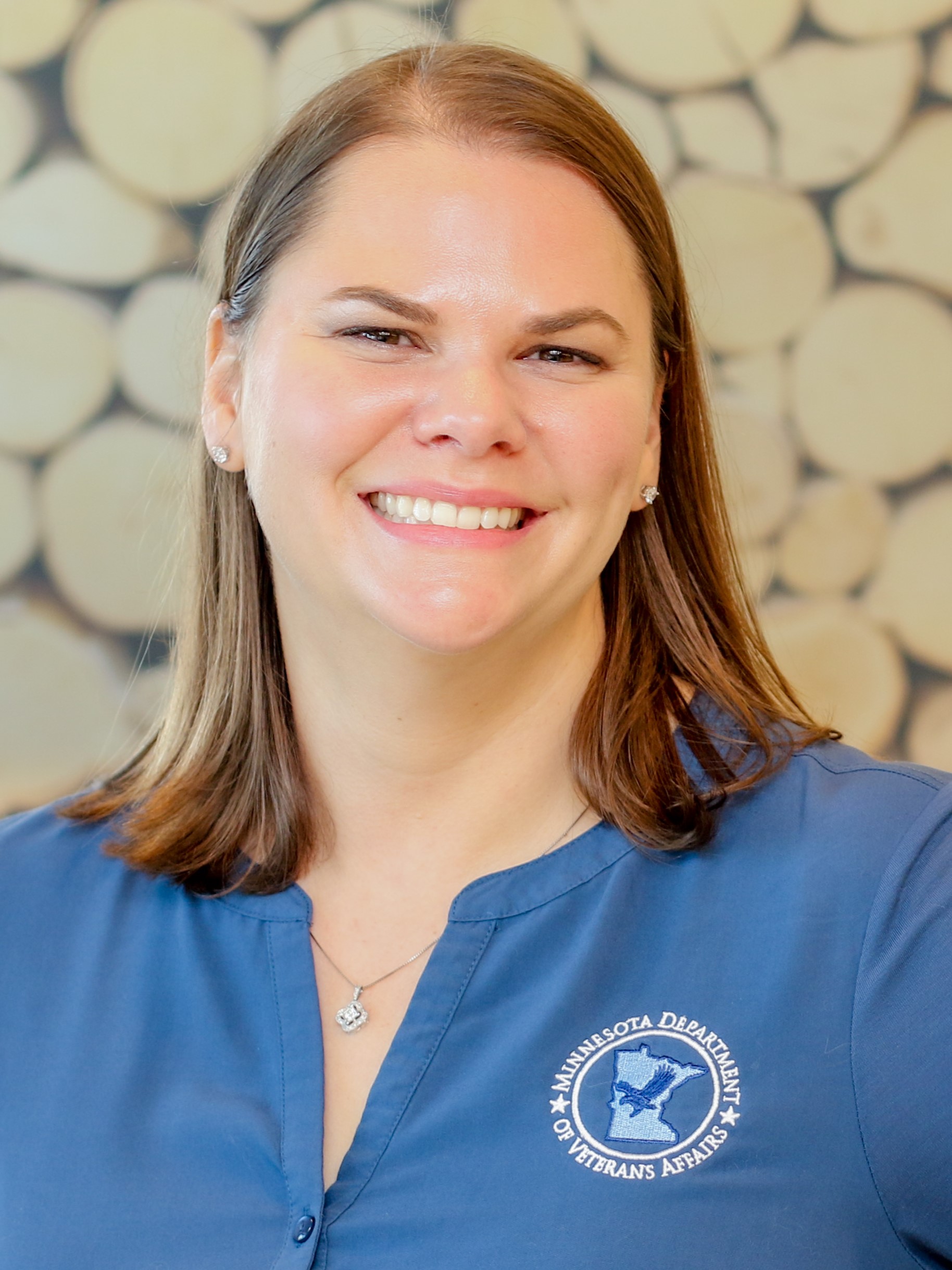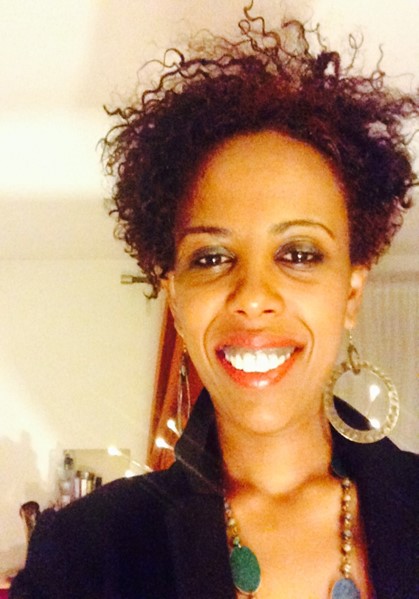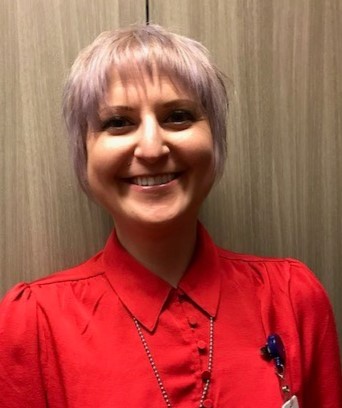3/5/2024 12:00:00 PM
March is Women’s History Month, when we remember, honor and celebrate women representing all walks of life.
Each year the month focuses on a specific theme. According to the National Women’s History Alliance, this year’s theme is “Women Who Advocate for Equity, Diversity and Inclusion."
We asked three Minnesota Department of Veterans Affairs team members to share their thoughts on working at the MDVA and what it means to make a difference in the workplace and our community.
 Kerry Allison is a Senior Veterans Claims Representative in the Veterans Service Claims East Office. She’s worked at the MDVA for a little more than two years.
Kerry Allison is a Senior Veterans Claims Representative in the Veterans Service Claims East Office. She’s worked at the MDVA for a little more than two years.
What about your work gets you out of bed each morning?
I love advocating and connecting with the Veterans I work with. When I talk with a Veteran who has just about given up, it encourages me to do what I can to help them. When I finally get to call them and let them know the outcome, nothing makes me happier than knowing I did my best, they didn’t give up and that they got what they deserved. I know that when they refer other Veterans to me, or they call me every few months just to say hello, that I’ve impacted their lives and they’ve impacted mine.
Why is it important to honor Women’s History Month?
Women’s History Month is a great time to celebrate and discover things about women who’ve changed the world for the better. There have been so many influential women who changed history through their art, scientific discoveries, or civil rights movements that can really inspire younger generations. The accomplishments should be celebrated.
Tell us about your experience in seeing bias and the need to end discrimination?
Recently, I had the honor to speak at my children’s school for Veteran’s Day. I decided to talk about the importance of volunteering, how Veterans continue to serve after they take off their uniforms, and how asking a Veteran about their service and thanking them can make a big impact in their lives.
As I sat anxiously preparing to get up to talk to the Veterans, staff and students that day, I listened to the opening remarks. I heard the principal say that as he sat in his office and watched all these Veterans coming in the door, all he saw were his superheroes. He told the children how he envisioned each person being a different superhero. “There is Captain America, there is the Hulk, there’s Spiderman, there is Thor,” as he pointed to different Veterans in the room.
A simple thing that typically goes unnoticed by most—but as a female who served, you can’t help but ask yourself: “Where are the female superheroes?” There were plenty of female Veterans in attendance. As we walked in, our spouses—who never served—were thanked for their service, even though we were the ones wearing a shirt or a hat that represents our branch of service or a service organization that we belong to. People assume that women wear these because their husband served.
The same is true for many service organizations. The first service organization I walked into, I was told the auxiliary met elsewhere. They didn’t want women there. They go to the meeting to get away from their wives. I never went back. I joined a different service organization that I dedicated years to. I felt that I made an impact in Veterans lives.
After years of volunteering and working my way up the ranks, I was told that I did not fit the mold for what they believed a state commander should be because I had a family and a career. It became clear that the organization was still a “good ol’ boys club” not ready for change.
Ending discrimination and breaking the invisible barriers women face in achieving equality and inclusion ensures that women are receiving the same treatment, rights and benefits. The one thing I believe is that every woman wants to be seen and treated equally.
We served and we’re continuing to serve. We’re passionate about what we do, especially for our Veterans.
 Weyny Gottlel is a Health Information Specialist at Minnesota Veterans Home - Minneapolis who has worked for MDVA for more than 16 years.
Weyny Gottlel is a Health Information Specialist at Minnesota Veterans Home - Minneapolis who has worked for MDVA for more than 16 years.
What about your work gets you out of bed each morning?
The feeling of being needed. It’s not just that my employer needs me to work an 8-hour shift—but it’s the feeling of my resident needing me to make their day as pleasant as it can be. I no longer have as much direct care relationship with the resident as I used to, but the idea set in my heart about what we do here for our residents. We don’t just care for the elderly; we care for Veterans. For someone who migrated from Ethiopia and become a naturalized citizen—to be able to experience the full force of freedom—it’s a debt to pay for these Veterans. To make it short, that is what gets me up and get going in this era of burnout.
Why is it important to honor Women’s History Month?
So that the next generation of women—especially Black women—can lead and inspire leadership without being second-guessed, seen as second choice, or face any bias or discrimination.
Tell us about your experience in seeing bias and the need to end discrimination?
I’ve seen my share of every bias and discrimination. It doesn’t help that I fit all the categories of woman, Black, and immigrant. Through all of this I speak up and raise my opinion. I believe if you see something, say something. Silence is complicity!
 Dani Donner is Administrator at Minnesota Veterans Homes – Silver Bay. She’s been an MDVA employee for 16 years. Dani started as a Recreation Assistant, then became a Life Enrichment Coordinator, then the Life Enrichment Coordinator Director. She’s been in her current role the last three years.
Dani Donner is Administrator at Minnesota Veterans Homes – Silver Bay. She’s been an MDVA employee for 16 years. Dani started as a Recreation Assistant, then became a Life Enrichment Coordinator, then the Life Enrichment Coordinator Director. She’s been in her current role the last three years.
What about your work gets you out of bed each morning?
I love the fact that every day is different. Some days can be challenging but I enjoy conquering that challenge. I love to spend time with the residents and listen to their stories. I enjoy connecting and getting to know my staff as well. We all make up our Vets Home family.
Why is it important to honor Women’s History Month?
It’s important to recognize and honor the accomplishments women have made over the years to better this world, many of which went unnoticed. Women have made many contributions over the years and deserve to be acknowledged.
Tell us about your experience in seeing bias and the need to end discrimination?
I see biases all the time both conscious and unconscious. It’s important to be able to acknowledge that we all have biases and educate ourselves to help overcome them.
Discrimination lies at the root of many of the world’s problems. It’s harmful and spreads inequality. We all have the right to be treated equally regardless of race, ethnicity, class, religion, gender, sexual orientation, gender identity, age and health.